大学英语语法(英语专业必看)
- 格式:doc
- 大小:35.00 KB
- 文档页数:3

英专生大一语法知识点一、名词名词作为英语语法中的一大类词汇,起到指代事物、人物、地点等作用。
名词分为可数名词和不可数名词两类。
1. 可数名词:指物质、抽象的概念或个体,可以用数目来计量。
- 单数形式:book, chair, student, apple, etc.- 复数形式:books, chairs, students, apples, etc.2. 不可数名词:指无法通过数目计量的抽象概念、物质或集体。
- water, milk, money, information, etc.二、冠词冠词用于修饰名词,分为不定冠词和定冠词。
1. 不定冠词:a/an,指泛指或特指的未确定的事物。
- a book, an apple2. 定冠词:the,指特指的或已知的事物。
- the book, the apple三、代词代词作为名词的替代词,用于替代特定的人或事物。
1. 人称代词:- 主格:I, you, he, she, it, we, they- 宾格:me, you, him, her, it, us, them2. 物主代词:- 形容词性物主代词:my, your, his, her, its, our, their- 名词性物主代词:mine, yours, his, hers, its, ours, theirs3. 反身代词:用于强调动作的承受者是动作的执行者本身。
- myself, yourself, himself, herself, itself, ourselves, yourselves, themselves四、动词动词用于描述动作、状态或发生的事件。
1. 动词时态:- 一般现在时:表示经常性、习惯性的动作。
I study English.- 现在进行时:表示正在进行的动作。
She is reading a book.- 一般过去时:表示过去某个时间发生的动作。
They played basketball yesterday.- 过去进行时:表示过去某个时间正在进行的动作。

大学英语语法总结(全面)大学英语语法总结(全面完整版)1. 介词(Prepositions)- 表示地点:at, in, on- 表示时间:at, in, on- 表示方式:by, with- 表示原因:because of, due to- 表示目的:for, to2. 冠词(Articles)- 定冠词:the- 不定冠词:a, an3. 代词(Pronouns)- 主格代词:I, you, he, she, it, we, they- 宾格代词:me, you, him, her, it, us, them- 所有格代词:my, your, his, her, its, our, their- 反身代词:myself, yourself, himself, herself, itself, ourselves, themselves4. 名词(Nouns)- 单数名词:book, chair, dog- 复数名词:books, chairs, dogs- 不可数名词:water, money, information5. 动词(Verbs)- 一般现在时:I walk, you walk, he/she/it walks, we walk, they walk- 一般过去时:I walked, you walked, he/she/it walked, we walked, they walked- 现在进行时:I am walking, you are walking, he/she/it is walking, we are walking, they are walking- 过去进行时:I was walking, you were walking, he/she/it was walking, we were walking, they were walking- 一般将来时:I will walk, you will walk, he/she/it will walk, we will walk, they will walk6. 形容词(Adjectives)- 描述名词特征:big, small, tall- 比较级:bigger, smaller, taller- 最高级:biggest, smallest, tallest7. 副词(Adverbs)- 表示方式:quickly, slowly- 表示程度:very, extremely- 表示时间:now, yesterday8. 连词(Conjunctions)- 表并列:and, or- 表递进:furthermore, moreover- 表转折:however, but- 表原因:because, since以上是大学英语语法的简要总结,希望对你有帮助。
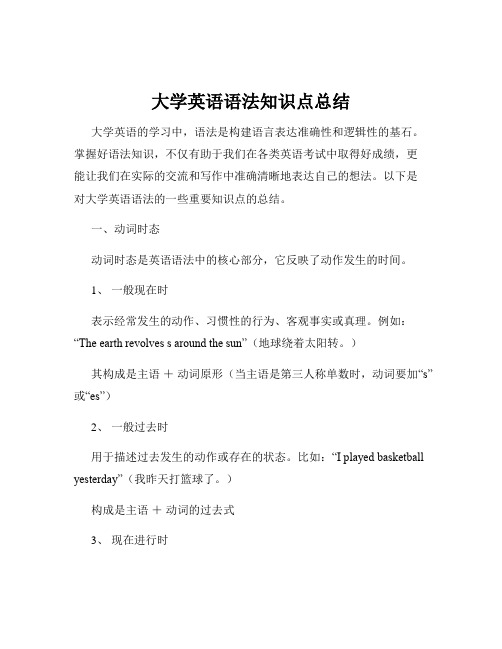
大学英语语法知识点总结大学英语的学习中,语法是构建语言表达准确性和逻辑性的基石。
掌握好语法知识,不仅有助于我们在各类英语考试中取得好成绩,更能让我们在实际的交流和写作中准确清晰地表达自己的想法。
以下是对大学英语语法的一些重要知识点的总结。
一、动词时态动词时态是英语语法中的核心部分,它反映了动作发生的时间。
1、一般现在时表示经常发生的动作、习惯性的行为、客观事实或真理。
例如:“The earth revolves s around the sun”(地球绕着太阳转。
)其构成是主语+动词原形(当主语是第三人称单数时,动词要加“s”或“es”)2、一般过去时用于描述过去发生的动作或存在的状态。
比如:“I played basketball yesterday”(我昨天打篮球了。
)构成是主语+动词的过去式3、现在进行时表示正在进行的动作。
像:“He is reading a book now”(他正在读书。
)结构为:主语+ be 动词(am/is/are)+动词的现在分词4、过去进行时强调过去某个时刻正在进行的动作。
例如:“I was doing myho mework at 8 o'clock last night”(昨晚八点我正在做作业。
)其形式为:主语+ was/were +动词的现在分词5、现在完成时表示过去发生的动作对现在造成的影响或结果,或者过去的动作一直持续到现在。
例如:“I have finished my work”(我已经完成了工作。
)由“主语+ have/has +动词的过去分词”构成6、过去完成时表示过去某一时间或动作之前已经发生或完成的动作。
例如:“By the end of last year, I had learned 5000 words”(到去年年底,我已经学了5000 个单词。
)结构为:主语+ had +动词的过去分词7、一般将来时用以表达将来要发生的动作或存在的状态。

第一章基本句型1.句子成分1)主语:表示句子所说为何人或何物,可由名词(词组)、代词、数词、不定式(短语)、动词-ing 形式(短语)和名词从句等充当。
A foreign language is a weapon in the struggle of life. The farmer plowed his field.He enjoys camping in the mountains. To translate this ideal into reality needs hard work. Living in that island country for three months was an unforgettable experience for me. Two will be enough.Whether we’ll go depends on the weather.That they failed in their attempt is entirely understandable.2) 谓语:说明主语做什么或是什么,由动词充当,须与主语保持人称和数的一致。
动词的性质决定其是否必须跟主语补语、宾语、宾语补语以及状语等后续成分。
People’s standards of living are going up steadily.I may be wrong.He watched horrified by the terrible accident. I stood on the porch, dumb, expectant.She left the room angry and frustrated. She looked sad and discouraged.We have long been hoping to visit your country. We have to do something for them.It was proposed that he cultural relations between the two countries be expanded.For many years he remained single. He is called Little Tiger.3) 表语:说明主语是什么或怎么样,可由名词(词组)、代词、数词、形容词、分词、动名词、不定式(短语)、副词、介词短语、词组、从句等充当。


英专大一语法知识点总结一、主语和谓语动词的一致性主语和谓语动词在人称和数上必须保持一致。
如果主语是第三人称单数,谓语动词要加上-s或-es。
例如:- She loves running in the park.(她喜欢在公园里跑步。
)- The dog barks loudly at night.(那只狗在晚上大声叫。
)二、时态的正确使用在英语中,时态有过去、现在和将来三种,每种时态的使用都有一定的规则。
以下是一些常用时态的用法:1. 一般现在时:表示常态、客观事实、经常性、习惯等情况。
例如:- I usually go to school by bus.(我通常坐公交车去学校。
)- Water boils at 100 degrees Celsius.(水在100摄氏度沸腾。
)2. 现在进行时:表示现在正在进行的动作或状态。
例如:- He is studying in the library.(他正在图书馆学习。
)- We are having dinner.(我们正在吃晚饭。
)3. 一般过去时:表示过去发生的动作或状态。
例如:- I visited my grandparents last weekend.(上个周末我去看望了我的祖父母。
)- She lived in London when she was young.(她年轻的时候住在伦敦。
)4. 过去进行时:表示过去正在进行的动作或状态。
例如:- They were playing basketball at 5 p.m. yesterday.(昨天下午5点他们在打篮球。
)- I was studying for the exam all night.(我整夜都在备考。
)5. 一般将来时:表示将来某个时间要发生的动作或状态。
例如:- We will have a party next week.(下周我们将举办派对。
)- She is going to travel around the world.(她打算环游世界。

大学英语语法学习提纲一、词类、句子成分和构词法:1、词类:英语词类分十种:名词、形容词、代词、数词、冠词、动词、副词、介词、连词、感叹词。
1、名词(n.):表示人、事物、地点或抽象概念的名称。
如:boy, morning, bag, ball, class, orange.2、代词(pron.):主要用来代替名词。
如:who, she, you, it .3、形容词(adj..):表示人或事物的性质或特征。
如:good, right, white, orange .4、数词(num.):表示数目或事物的顺序。
如:one, two, three, first, second, third, fourth.5、动词(v.):表示动作或状态。
如:am, is,are,have,see .6、副词(adv.):修饰动词、形容词或其他副词,说明时间、地点、程度等。
如:now, very,here, often, quietly, slowly.7、冠词(art..):用在名词前,帮助说明名词。
如:a, an, the.8、介词(prep.):表示它后面的名词或代词与其他句子成分的关系。
如in, on, from, above, behind.9、连词(conj.):用来连接词、短语或句子。
如and, but, before .10、感叹词(interj..)表示喜、怒、哀、乐等感情。
如:oh, well, hi, hello.2、句子成分:英语句子成分分为七种:主语、谓语、宾语、定语、状语、表语、宾语补足语。
1、主语是句子所要说的人或事物,回答是“谁”或者“什么”。
通常用名词或代词担任。
如:I’m Miss Green.(我是格林小姐)2、谓语动词说明主语的动作或状态,回答“做(什么)”。
主要由动词担任。
如:Jack cleansthe room every day. (杰克每天打扫房间)3、表语在系动词之后,说明主语的身份或特征,回答是“什么”或者“怎么样”。

大学英语必会语法知识(精华打印版)一、虚拟语气1) 概念虚拟语气用来表示说话人的主观愿望或假想,所说的是一个条件,不一定是事实,或与事实相反。
2) 在条件句中的应用条件句可分为两类,一类为真实条件句,一类为非真实条件句。
非真实条件句表示的是假设的或实际可能性不大的情况,故采用虚拟语气。
二、真实条件句真实条件句用于陈述语气,假设的情况可能发生,其中if 是如果的意思。
时态关系句型:条件从句主句一般现在时shall/will + 动词原形If he comes, he will bring his violin.典型例题The volleyball match will be put off if it ___.A.will rainB. rainsC. rainedD. is rained答案B。
真实条件句主句为将来时,从句用一般现在时。
注意:1) 在真实条件句中,主句不能用be going to表示将来,该用shall, will.(错) If you leave now, you are never going to regret it.(对) If you leave now, you will never regret it.2) 表示真理时,主句谓语动词便不用shall (will) +动词原形,而直接用一般现在时的动词形式。
三、非真实条件句时态:可以表示过去,现在和将来的情况。
它的基本特点是时态退后。
a.同现在事实相反的假设。
句型:条件从句主句一般过去时should( would) +动词原形If they were here, they would help you.b.表示于过去事实相反的假设。
句型:条件从句主句过去完成时should(would) have+ 过去分词If she had worked harder, she would have succeeded.The rice would not have been burnt if you had been more careful.If my lawyer had been here last Saturday, he would have prevented me from going.If he had come yesterday, I should / would have told him about it.含义:He did not come yesterday, so I did not tell him about it.If he had not been ill and missed many classes, he would have made greater progress.含义:He was ill and missed many lessons, so he did not make greater progress.c.表示对将来的假想句型:条件从句主句一般过去时should+ 动词原形were+ 不定式would + 动词原形should+ 动词原形If you succeeded, everything would be all right.If you should succeed, everything would be all right.If you were to succeed, everything would be all right.四、虚拟条件句的倒装虚拟条件句的从句部分如果含有were, should, 或had, 可将if省略,再把were, should或had 移到从句句首,实行倒装。

大学英语语法汇总在大学英语学习中,语法是学生们十分关注的重要方面。
掌握英语语法对于正确理解和运用英语至关重要。
本文将对大学英语常见的几个语法知识点进行汇总和讲解。
一、句子结构句子是表达完整意义的基本单位,包括主语、谓语、宾语等成分。
以下是常见的句子结构:1. 简单句:只包含一个主谓结构例句:She sings beautifully.(她唱得很好听。
)2. 复合句:由主句和从句构成例句:I will go to the park if it doesn't rain.(如果不下雨,我会去公园。
)3. 并列句:由并列连词(如and,but等)连接的两个或多个句子例句:He is studying for the final exam, but he is also preparing for his graduation ceremony.(他正在备考期末考试,同时也在准备毕业典礼。
)4. 疑问句:以疑问词(如what,where,how等)开头,用来询问信息例句:Where is the closest supermarket?(最近的超市在哪里?)二、时态和语态时态和语态是英语语法中常见的两个考点。
时态表示句子所描述事件发生的时间,而语态则表示句子中主语的作用。
1. 时态:- 现在时:表示现在正在发生或经常发生的动作例句:I am studying in the library.(我正在图书馆学习。
)- 过去时:表示过去某个时间发生的动作例句:She cooked dinner yesterday.(昨天她做了晚饭。
)- 将来时:表示将来某个时间将要发生的动作例句:We will have a meeting tomorrow afternoon.(明天下午我们将开会。
)2. 语态:- 主动语态:表示主语是动作的执行者例句:I clean the house every weekend.(我每个周末清扫房子。
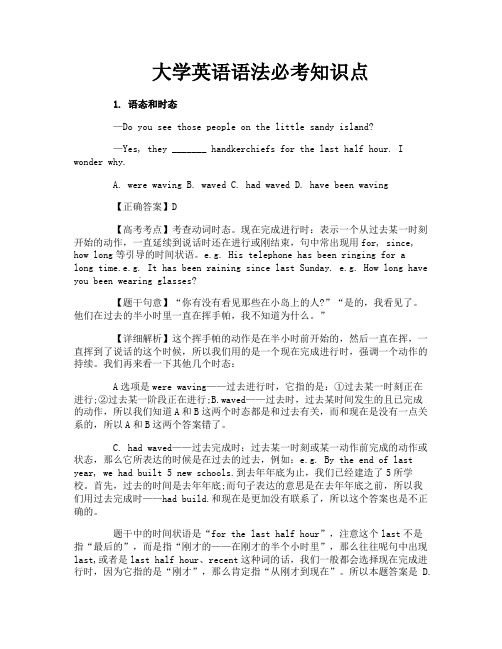
大学英语语法必考知识点1. 语态和时态—Do you see those people on the little sandy island?—Yes, they _______ handkerchiefs for the last half hour. I wonder why.A. were wavingB. wavedC. had wavedD. have been waving【正确答案】D【高考考点】考查动词时态。
现在完成进行时:表示一个从过去某一时刻开始的动作,一直延续到说话时还在进行或刚结束,句中常出现用for, since, how long等引导的时间状语。
e.g. His telephone has been ringing for along time.e.g. It has been raining since last Sunday. e.g. How long have you been wearing glasses?【题干句意】“你有没有看见那些在小岛上的人?”“是的,我看见了。
他们在过去的半小时里一直在挥手帕,我不知道为什么。
”【详细解析】这个挥手帕的动作是在半小时前开始的,然后一直在挥,一直挥到了说话的这个时候,所以我们用的是一个现在完成进行时,强调一个动作的持续。
我们再来看一下其他几个时态:A选项是were waving——过去进行时,它指的是:①过去某一时刻正在进行;②过去某一阶段正在进行;B.waved——过去时,过去某时间发生的且已完成的动作,所以我们知道A和B这两个时态都是和过去有关,而和现在是没有一点关系的,所以A和B这两个答案错了。
C. had waved——过去完成时:过去某一时刻或某一动作前完成的动作或状态,那么它所表达的时候是在过去的过去,例如:e.g. By the end of last year, we had built 5 new schools.到去年年底为止,我们已经建造了5所学校。

大学英语语法重点归纳总结在学习英语过程中,语法一直是学生们较为困惑的一部分,也是需要掌握的重要基础知识。
本文将对大学英语语法的重点进行归纳总结,帮助读者更好地掌握英语语法知识。
一. 词类及其基本特点1. 名词(Noun)- 名词可以指示人、事物、地点、抽象概念等。
- 大多数名词可以用单数形式和复数形式。
- 名词可以有不同的格(主格、宾格、所有格)表示不同的功能。
2. 代词(Pronoun)- 代词用来代替名词,避免重复。
- 代词有人称、物主、指示、疑问、反身等不同形式。
3. 动词(Verb)- 动词表示行为、状态或事件的发生。
- 动词可以有不同的时态(现在时、过去时、未来时等)、语态(主动语态、被动语态)和语气(陈述语气、命令语气、疑问语气等)。
4. 形容词(Adjective)- 形容词用来修饰名词或代词,描述其性质或状态。
- 形容词可以有不同的级别(原级、比较级、最高级)表示程度的差异。
5. 副词(Adverb)- 副词主要用来修饰动词、形容词或其他副词,表示时间、地点、方式、程度等。
- 副词可以有不同的级别(原级、比较级、最高级)表示程度的差异。
6. 介词(Preposition)- 介词与其他词组合,表示时间、地点、方向等概念。
- 介词通常与名词或代词搭配使用,构成介词短语。
7. 连词(Conjunction)- 连词用来连接词语、短语或句子,起到衔接、承接或对比的作用。
- 连词可以分为并列连词、从属连词和关联连词等。
8. 冠词(Article)- 冠词用于限定名词,包括定冠词(the)和不定冠词(a/an)。
二. 句子结构及语序1. 主谓结构- 英语句子通常采用主谓结构,即主语+谓语动词。
2. 主谓宾结构- 在主谓结构的基础上,加入宾语,形成主谓宾结构。
3. 主谓表结构- 在主谓结构的基础上,加入表语(形容词、名词等),形成主谓表结构。
4. 主谓双宾结构- 在主谓宾结构的基础上,加入间接宾语,形成主谓双宾结构。

大学英语语法句型知识点汇总在大学英语的学习中,语法句型是构建语言大厦的基石。
掌握丰富的语法句型知识,不仅能够帮助我们更准确地理解英语文章,还能让我们在写作和口语表达中更加流畅自如。
下面,让我们一起来汇总一下大学英语中重要的语法句型知识点。
一、陈述句陈述句是用来陈述事实或表达观点的句子,在英语中最为常见。
其基本结构为“主语+谓语+宾语”。
例如:“I like reading books”(我喜欢读书。
)其中,“I”是主语,表示动作的执行者;“like”是谓语,表达主语的行为;“reading books”是宾语,是动作的对象。
二、疑问句疑问句用于提出问题,分为一般疑问句、特殊疑问句和反意疑问句。
1、一般疑问句通常以助动词、be 动词或情态动词开头,用“yes”或“no”回答。
比如:“Are you a student?”(你是一名学生吗?)“Do you like music?”(你喜欢音乐吗?)2、特殊疑问句由特殊疑问词(what, when, where, why, how 等)引导,对句子中的某一部分进行提问。
像:“What do you want to eat?”(你想吃什么?)“Where did you go yesterday?”(你昨天去哪儿了?)3、反意疑问句由两部分组成,前一部分是陈述句,后一部分是简短的疑问句。
如果前一部分是肯定,后一部分就用否定;反之亦然。
例如:“You are a teacher, aren't you?”(你是一名老师,不是吗?)“He didn't come, did he?”(他没来,是吗?)三、祈使句祈使句用于表达命令、请求、建议等。
其特点是主语通常被省略,以动词原形开头。
比如:“Open the door, please”(请开门。
)“Don't smoke here”(别在这儿抽烟。
)四、感叹句感叹句用于表达强烈的情感,有“what”和“how”引导的两种结构。
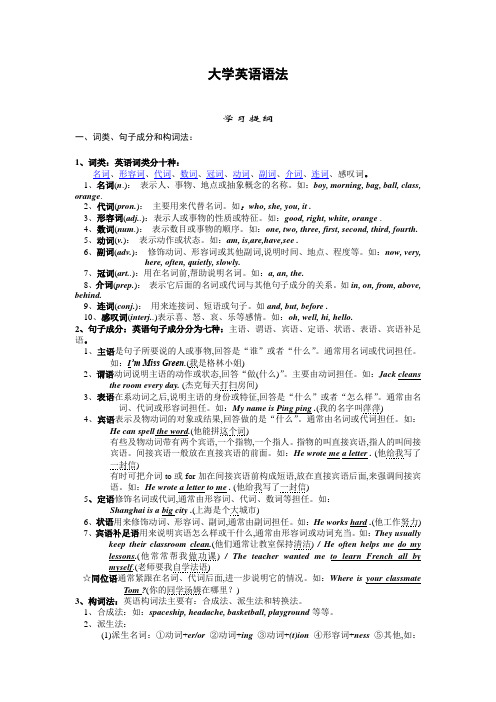
大学英语语法学习提纲一、词类、句子成分和构词法:1、词类:英语词类分十种:名词、形容词、代词、数词、冠词、动词、副词、介词、连词、感叹词。
1、名词(n.):表示人、事物、地点或抽象概念的名称。
如:boy, morning, bag, ball, class, orange.2、代词(pron.):主要用来代替名词。
如:who, she, you, it .3、形容词(adj..):表示人或事物的性质或特征。
如:good, right, white, orange .4、数词(num.):表示数目或事物的顺序。
如:one, two, three, first, second, third, fourth.5、动词(v.):表示动作或状态。
如:am, is,are,have,see .6、副词(adv.):修饰动词、形容词或其他副词,说明时间、地点、程度等。
如:now, very,here, often, quietly, slowly.7、冠词(art..):用在名词前,帮助说明名词。
如:a, an, the.8、介词(prep.):表示它后面的名词或代词与其他句子成分的关系。
如in, on, from, above, behind.9、连词(conj.):用来连接词、短语或句子。
如and, but, before .10、感叹词(interj..)表示喜、怒、哀、乐等感情。
如:oh, well, hi, hello.2、句子成分:英语句子成分分为七种:主语、谓语、宾语、定语、状语、表语、宾语补足语。
1、主语是句子所要说的人或事物,回答是“谁”或者“什么”。
通常用名词或代词担任。
如:I’m Miss Green.(我是格林小姐)2、谓语动词说明主语的动作或状态,回答“做(什么)”。
主要由动词担任。
如:Jack cleansthe room every day. (杰克每天打扫房间)3、表语在系动词之后,说明主语的身份或特征,回答是“什么”或者“怎么样”。

大学英语语法第一章高频语法第一节时态和语态一,动词时态1:一般现在时:主语+动词原形(若主语是第三人称单数,动词原形一般加-s或-es)考点:在时间或条件状语从句中,用一般现在时代替一般将来时。
例句:I will tell her when she comes tomorrow.明天她来的时候我会告诉她的。
2:一般过去时:主语加动词的过去式。
3:一般将来时:主语+shall/will+动词原形主语+be going to+动词原形;主语+be+动词不定式,主语+be about+动词不定式;主语+be+现在分词(仅限位移动词)考点:祈使句+and/or+陈述句结构中,and/or后面的句子应用一般将来时。
而其前面的祈使句部分表示条件。
如果前后是顺承关系就用暗的,如果前后是转折关系则用or。
例句:Give me one more hour.And I will get the work finished。
再给我一个小时我就能完成这项工作。
4:现在进行时:主语+am/is/are+现在分词5:过去进行时:主语+was/were+现在分词6:将来进行时:主语+shall/will be+现在分词7:现在完成时:主语+have/has+过去分词考点:表示从过去某个时间开始,延续到现在,并仍然可能延续下去的动作。
现在完成时常与表示一段时间的状语连用(如so far,up to know, since ,for a long time, for the past few years 等)8:过去完成时:主语+had+过去分词(考点)9:将来完成时:主语+shall/will have+过去分词(考点)10:现在完成进行时:主语+have/has been+现在分词(考点)11:过去完成进行时:主语+had been+现在分词12:过去将来时:主语+should/would+动词原形二,被动语态1:被动语态的用法(1)当不知道或没有必要指出动作的执行者时。
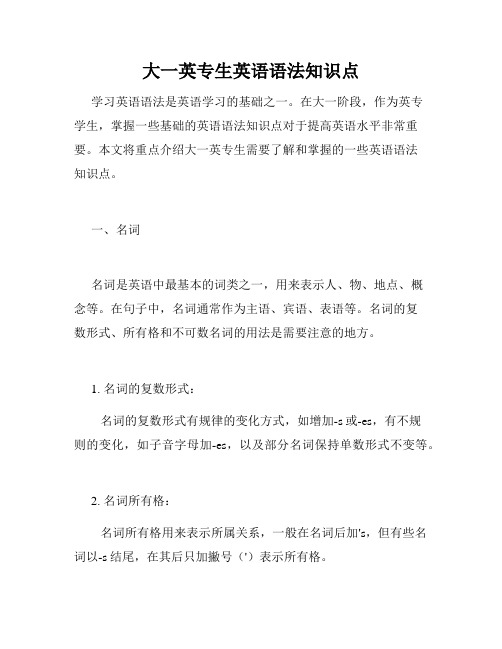
大一英专生英语语法知识点学习英语语法是英语学习的基础之一。
在大一阶段,作为英专学生,掌握一些基础的英语语法知识点对于提高英语水平非常重要。
本文将重点介绍大一英专生需要了解和掌握的一些英语语法知识点。
一、名词名词是英语中最基本的词类之一,用来表示人、物、地点、概念等。
在句子中,名词通常作为主语、宾语、表语等。
名词的复数形式、所有格和不可数名词的用法是需要注意的地方。
1. 名词的复数形式:名词的复数形式有规律的变化方式,如增加-s或-es,有不规则的变化,如子音字母加-es,以及部分名词保持单数形式不变等。
2. 名词所有格:名词所有格用来表示所属关系,一般在名词后加's,但有些名词以-s结尾,在其后只加撇号(')表示所有格。
3. 不可数名词:不可数名词是指不能用复数形式表示的名词,如water、furniture等。
它们在句子中既不能与a/an连用,也不能用于复数形式。
二、动词时态和语态动词时态和语态在英语语法中是需要重点掌握的部分。
时态表示动作发生的时间,而语态表示动作的主体和客体关系。
1. 动词的时态:英语中的时态有一般现在时、一般过去时、一般将来时等,根据句子的时间和情境选择适当的时态是学习英语时态的关键。
2. 动词的语态:英语中的语态有主动语态和被动语态。
主动语态表示主语是动作的执行者,而被动语态表示主语是动作的承受者。
三、冠词和代词冠词和代词是英语中常用的小词,但使用却有一定的规律和差异。
1. 冠词的用法:冠词分为定冠词和不定冠词。
定冠词包括"the",表示特指;不定冠词包括"a"和"an",表示泛指。
2. 代词的用法:代词在句子中用来代替名词,可以分为人称代词、物主代词、指示代词、不定代词等。
不同的代词在句子中起到不同的作用。
四、形容词和副词形容词和副词在英语中用于修饰名词或动词,是用来描述和补充信息的重要部分。
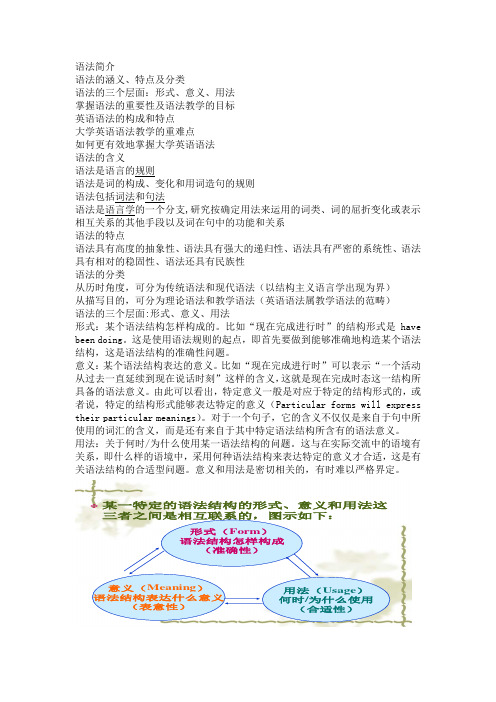
语法简介语法的涵义、特点及分类语法的三个层面:形式、意义、用法掌握语法的重要性及语法教学的目标英语语法的构成和特点大学英语语法教学的重难点如何更有效地掌握大学英语语法语法的含义语法是语言的规则语法是词的构成、变化和用词造句的规则语法包括词法和句法语法是语言学的一个分支,研究按确定用法来运用的词类、词的屈折变化或表示相互关系的其他手段以及词在句中的功能和关系语法的特点语法具有高度的抽象性、语法具有强大的递归性、语法具有严密的系统性、语法具有相对的稳固性、语法还具有民族性语法的分类从历时角度,可分为传统语法和现代语法(以结构主义语言学出现为界)从描写目的,可分为理论语法和教学语法(英语语法属教学语法的范畴)语法的三个层面:形式、意义、用法形式:某个语法结构怎样构成的。
比如“现在完成进行时”的结构形式是have been doing。
这是使用语法规则的起点,即首先要做到能够准确地构造某个语法结构,这是语法结构的准确性问题。
意义:某个语法结构表达的意义。
比如“现在完成进行时”可以表示“一个活动从过去一直延续到现在说话时刻”这样的含义,这就是现在完成时态这一结构所具备的语法意义。
由此可以看出,特定意义一般是对应于特定的结构形式的,或者说,特定的结构形式能够表达特定的意义(Particular forms will express their particular meanings)。
对于一个句子,它的含义不仅仅是来自于句中所使用的词汇的含义,而是还有来自于其中特定语法结构所含有的语法意义。
用法:关于何时/为什么使用某一语法结构的问题。
这与在实际交流中的语境有关系,即什么样的语境中,采用何种语法结构来表达特定的意义才合适,这是有关语法结构的合适型问题。
意义和用法是密切相关的,有时难以严格界定。
某一特定的语法结构的形式、意义和用法这三者之间是相互联系的,图示如下:形式(Form)语法结构怎样构成(准确性)意义(Meaning)语法结构表达什么意义(表意性)用法(Usage)何时/为什么使用(合适性)语法形式、意义、用法三者之间的关系:英语学习者要能够准确地、有意义地、恰当地去运用英语语言结构。

英语专业大一语法知识点1. 什么是语法知识点英语语法知识点是指英语中的语法规则、语法结构和语法用法等方面的内容。
在学习英语专业的过程中,掌握语法知识点对于提高英语水平和语言表达能力是至关重要的。
2. 时态时态是英语语法中的常见知识点之一,用来表达事件发生的时间或状态的持续性。
常见的时态包括:- 一般现在时:表示经常性或习惯性的动作(例:I eat breakfast every day.)- 过去时:表示过去发生的动作或状态(例:She went to the park yesterday.)- 将来时:表示将来要发生的动作(例:They will go for a trip next week.)- 现在进行时:表示现在正在进行的动作(例:I am studying for the exam now.)- 过去进行时:表示过去某个时间点正在进行的动作(例:He was watching TV when I called him.)3. 语态语态是指句子中的动作主体和受动者的关系。
常用的语态有: - 主动语态:动作的执行者是主语(例:She writes a letter.)- 被动语态:动作的接受者是主语(例:The letter was written by her.)4. 句型结构英语句子的结构和排列是语法知识中的重要部分,常见的句型结构有:- 主谓结构:由主语和谓语构成的简单句(例:She sings beautifully.)- 主谓宾结构:由主语、谓语和宾语构成的句子(例:He bought a new car.)- 主系表结构:由主语、系动词和表语构成的句子(例:Sheis a doctor.)5. 语法规则学习语法知识点还包括掌握一些语法规则,例如:- 主谓一致:主语单数时动词要用单数形式,主语复数时动词要用复数形式(例:She likes ice cream. They like ice cream.) - 比较级和最高级:用来表示两个或多个事物之间的比较(例:She is taller than her sister. He is the tallest person in the class.)6. 语法用法在学习语法知识点的过程中,还需要了解一些常见的语法用法,例如:- 直接引语和间接引语:表示他人的原话时要使用引号(例:He said, "I am going home.")- 条件句:用来表示条件或假设,有三种类型(例:If it rains, we will stay at home.)7. 总结英语专业大一的语法知识点对于学习和提高英语水平至关重要。
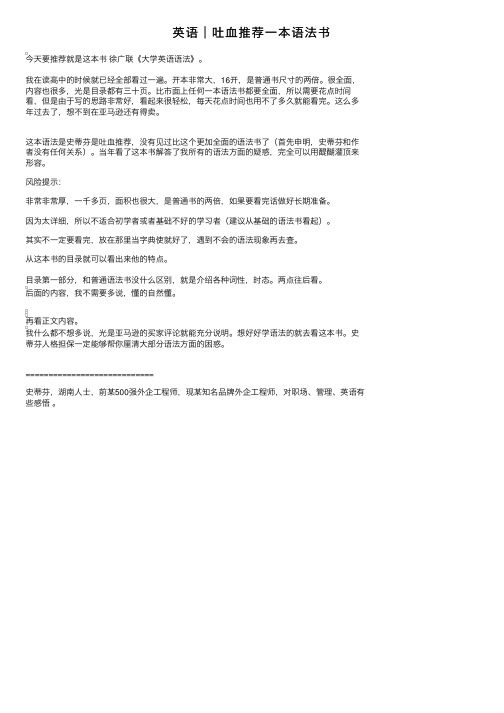
英语︱吐⾎推荐⼀本语法书
今天要推荐就是这本书徐⼴联《⼤学英语语法》。
我在读⾼中的时候就已经全部看过⼀遍。
开本⾮常⼤,16开,是普通书尺⼨的两倍。
很全⾯,内容也很多,光是⽬录都有三⼗页。
⽐市⾯上任何⼀本语法书都要全⾯,所以需要花点时间看,但是由于写的思路⾮常好,看起来很轻松,每天花点时间也⽤不了多久就能看完。
这么多年过去了,想不到在亚马逊还有得卖。
这本语法是史蒂芬是吐⾎推荐,没有见过⽐这个更加全⾯的语法书了(⾸先申明,史蒂芬和作者没有任何关系)。
当年看了这本书解答了我所有的语法⽅⾯的疑惑,完全可以⽤醍醐灌顶来形容。
风险提⽰:
⾮常⾮常厚,⼀千多页,⾯积也很⼤,是普通书的两倍,如果要看完话做好长期准备。
因为太详细,所以不适合初学者或者基础不好的学习者(建议从基础的语法书看起)。
其实不⼀定要看完,放在那⾥当字典使就好了,遇到不会的语法现象再去查。
从这本书的⽬录就可以看出来他的特点。
⽬录第⼀部分,和普通语法书没什么区别,就是介绍各种词性,时态。
两点往后看。
后⾯的内容,我不需要多说,懂的⾃然懂。
再看正⽂内容。
我什么都不想多说,光是亚马逊的买家评论就能充分说明。
想好好学语法的就去看这本书。
史蒂芬⼈格担保⼀定能够帮你厘清⼤部分语法⽅⾯的困惑。
============================
史蒂芬,湖南⼈⼠,前某500强外企⼯程师,现某知名品牌外企⼯程师,对职场、管理、英语有些感悟。
1.Noun
Identify the uncountable nouns
• 1. Nouns that have no distinct, separate parts, we look as the whole (气、液、固体) • 2. Nouns that have parts that are too small or insignificant to count (sand grass hair)
• 3. Nouns that are classes or categories of things (food, clothing, money) P49
• 4. Nouns that are abstraction (life, work, music)
• 5. Subjects of study (history, math)
不可数变可数三大规律
• 1. 物质名词(总称名词)若表示不同的种类,或者表示特定的意思,或者是液体名词表示“几杯”或“几瓶”这样的数量时。
• 2. 抽象名词若是具体化,则可数。
与此相反,可数转化为不可数。
• 3. 当一个名词表示抽象、总称的概念,则为不可数,当一个名词表示具体、特定的事物,则为可数。
物质名词/总称名词变可数
• 1. 总称名词具体化
•A: Would you like a cake?
•B: No. I don’t like cake.
• 2. 物质名词变意思
•I need some paper. / I bought a paper.
• 3. 液体物质名词表数量
•Two beers and three coffees, please.
抽象名词变可数
•Art (an art) / beauty (a beauty) / youth (a youth)
•Eg. 1. Youth is not a time of life. It is a state of mind.
• 2. When as a child I laughed and wept– time crept.
•When as a youth I dreamed and talked-time walked.
2Articles
Specific reference--the
• 1. 特指是针对交际双方来说的
• 2. 特指就是根据说话者和听话者共有的知识,或根据上下文,可以识别的事物。
• 3. 说话者用the是想要听话者找到双方心中都知道的所知,而听话者一方“断定”或“还原”所指对象的方法有多种。
• 1. Situational/cultural reference
•Eg. Albert Einstein, the famous physicist.
• 2. textual co-reference—
•anaphoric reference (前指)&
•cataphoric reference (后指
• 1. general knowledge (the sun, the moon, the North Pole, the Equator, the universe, the Renaissance, the Pope 罗马教皇)
• 2. specific knowledge/ local use (let’s go to the library)
• 3. immediate situation (The roses are very beautiful. Can you find the page?)
不定冠词泛指与非泛指
a/an +uncountable noun
• A washing powder I’ve found to be extremely good is “Tide”. (种类)
•I like a beer please. (一杯)
• A glass / an iron (意变)
Conditions when “one” is better
• 1. 强调数量“一”时用one (one only),
•C: when will they be ready? A: they take a week. C: One week, right, thanks.
• 2. 用于准确的对照数字
•Two kilos of flour and one litter of water.
• 3. 讲故事中用one, 强调人或事作为将要讲到的话题
•There is one place we go to which is a Mexican restaurant, and they had a happy
•hour between 5:30 and 7:30.
Conditions when “a/an” is better
• 1. 类指意义的”a/an”不能换”one”
• A shotgun is no good.
• 2. 表示度量的”a/an”不能换”one”
•The rent is $100 a week.
• 3. 表示数量的固定搭配”a/an”不能换”one”
• A few, a great many, a large number of
用不用冠词的意义区别
• 1. 家具生活类:at (the) table, in (the) bed
• 2. 处所、建筑物或社会机构:go to (the) prison, in/at (the)church, in (the) hospital • 3. 关于上学:class, school, college, university, desk
• 4. 关于sea: go to/ at/ by (the) sea
• 5. 抽象总称意义与具体特指意义: time, red, day, place, question, etc
使用冠词的场合
• 1. 形容词或副词的最高级、序数词以及only用作形容词加名词连用时,一般用the.
•The only/ best way to cope with the problem.
• 2. 乐器、乐团、合唱团及流行音乐团体前加the
•The Beatles/ Philadelphia Orchestra/ piano
• 3. the 与姓氏连用
•The Smiths, the Bushes
其他不用冠词的场合
• 1. 关于职业、身份或头衔
• 2. 关于球类、棋类运动(不加冠词)
• 3. 特殊名词(nature, society, history, man, space)
• 4. 关于星期
• 5. 关于四季
• 6. 关于昼夜各阶段(by, at, after, before)
•7. 关于进餐(有adj 则加the)
•8. 关于交通工具(by后不加,其他时候要加)
•9. 关于通讯工具(by后不加,其他时候要加)
•10. 平行结构
•关于职业、身份或头衔1. 独一无二头衔在表语位置
•John is (the) captain of the team
• 2.独一无二头衔在主语补足语位置
•He was elected President the second time.
• 3.独一无二头衔在宾语补足语位置
•We elected Henry chairman.
• 4.独一无二头衔在同位语位置
•Elizabeth II, Queen of England
特殊名词
•If you destroy nature you’ll suffer from it. (泛指自然界)
•Society turns people into criminals. (社会)
•Man has taken his first step into space. (泛指星球之间的空间) •Man can conquer nature, (泛指人类)
•History may repeat it self. (泛指人类整个历史)。